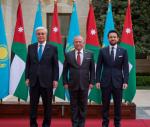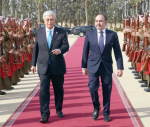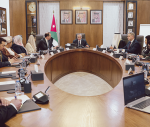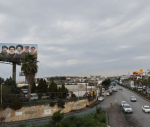You are here
Jordan, US arranging meeting over ‘violations’ to Syria de-escalation zone
By Mohammad Ghazal - Mar 14,2018 - Last updated at Mar 14,2018
AMMAN — Jordan said on Tuesday it was coordinating with the US an emergency meeting to be held in the Kingdom over reports of violations to the deal that established a de-escalation zone in southwestern Syria, a government official said.
“We are talking to the US in this regard,” he said, stressing that meetings between officials concerned with the zone are ongoing for purposes of “coordination, consultation and evaluation”.
The government official told The Jordan Times over the phone that Jordan was very keen on sustaining the de-escalation zone that was created last year following a tripartite agreement, involving Russia, he said.
“These meetings are crucial in continuing to maintain the successes achieved in the de-escalation zone created in the south of Syria,” the official added.
On Monday, the US called for an urgent meeting in Jordan out of concern over reports of strikes in southwestern Syria.
If verified, the reported strikes would be a clear violation of the ceasefire by the Syrian regime, broadening the conflict, a department official said in a statement quoted by Reuters.
“We urge all parties in the southwest de-escalation zone not to take actions that would jeopardise the ceasefire and make future cooperation more difficult… We have called an urgent meeting in Jordan to review the situation in southwest Syria and ensure maintenance of the de-escalation zone that the United States helped negotiate,” the US official said.
The Jordanian official referred to the tripartite agreement to back a ceasefire in southwestern Syria that went into effect in July last year, stressing that it was vital to eliminate terrorist groups and create an environment to push for a political solution in Syria.
The deal that was reached between the US, Russia and Jordan in Amman entailed a ceasefire along a line of contact agreed upon between Syrian government forces and associated troops on one side and rebels on the other.
The three parties agreed that the ceasefire aims to permanently de-escalate the tensions in southern Syria, ending acts of hostility, restoring stability and allowing free access of humanitarian aid for this key area in Syria.
Government officials said then that the deal was key for uprooting terrorist groups such as the so-called Khalid Ibn Al Walid Army, Al Nusra and any pockets affiliated to Daesh near the borders.
Related Articles
AMMAN — A report from the Centre for Defending Freedom of Journalists (CDFJ) said it recorded seven violations against four journalists in N
AMMAN — Jordan is closely following up on developments in the south of Syria, a government official said on Monday.“We are monitoring the de
AMMAN — The Foreign Ministry on Friday stressed the importance of preserving the de-escalation zone in southwestern Syria to stop the bloods















